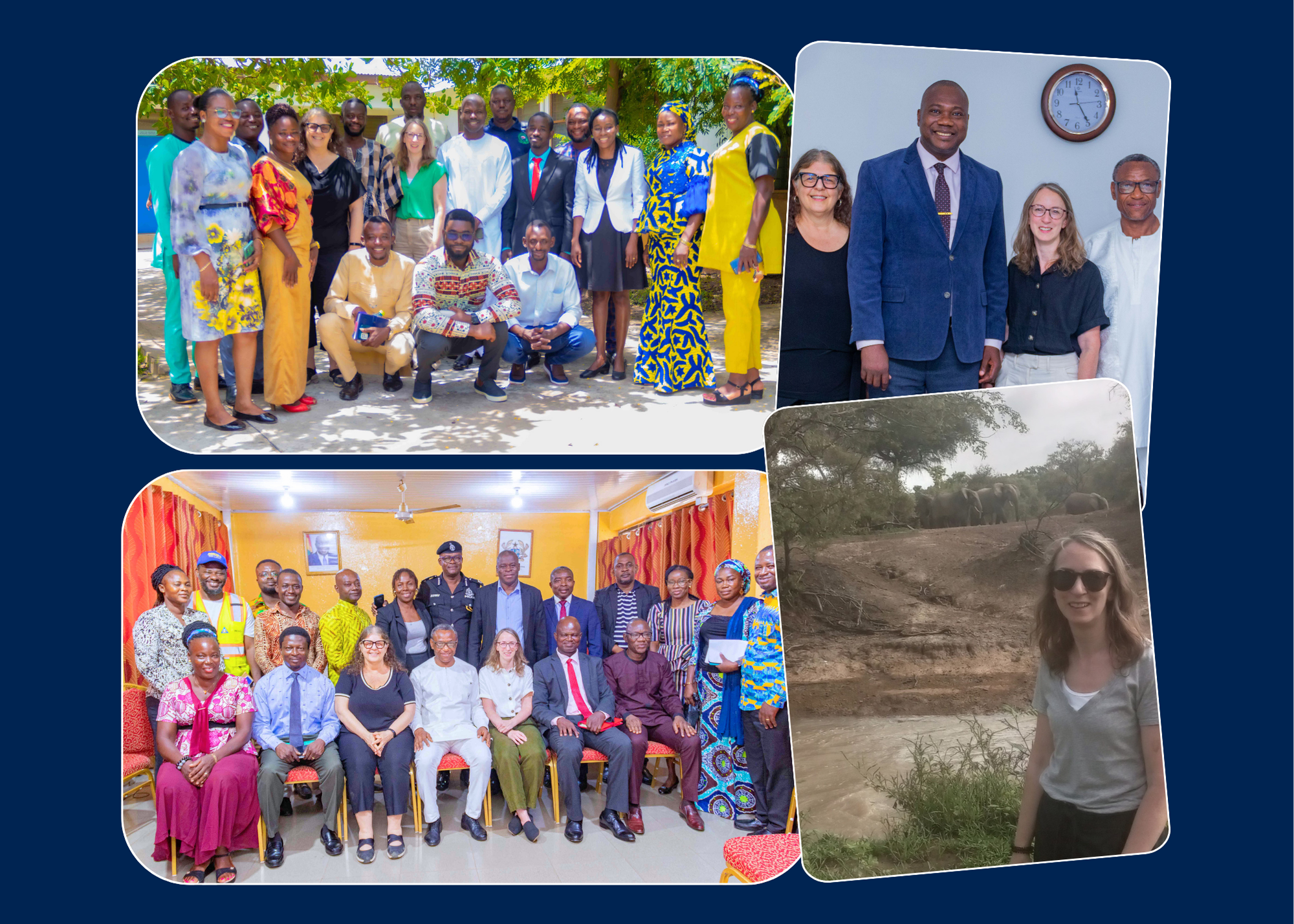
Queen’s membership in the AWB network provides staff and faculty members the opportunity to volunteer their expertise and knowledge to initiatives designed with higher education institutions in low and middle-income countries. Heather Merla (Academic Affairs and Special Projects Officer, School of Graduate Studies and Postdoctoral Affairs at Queen’s) shares her experience volunteering with Simon Diedong Dombo University of Business and Integrated Development Studies (SDD-UBIDS) in Ghana to enhance graduate student professional development.
My flight from Accra, Ghana to the city of Wa set the tone for a truly wonderful experience working with a team at the Simon Diedong Dombo University of Business and Integrated Development Studies (SDD-UBIDS). I happened to sit next to an MP for the region, and for the next hour and a half we spoke of many things – the conflicts and politics that loom in our minds, for instance, but of more uplifting things too, like the value of a History degree for a wide range of careers. Study of the past was a passion we shared. We discussed how, for many, the connection between a discipline such as History (in his case) or Art History (in mine) and the world of work is unclear. Students might understand the value of their skills and knowledge, but does an apprehensive hiring manager? How can students be supported in articulating their experiences and skills on the job market? Going one step further, how might students enhance and expand upon their degree-specific training through learning opportunities to support the transition to a meaningful career?
These aren’t questions applicable just to those in the Humanities. From my position within Queen’s School of Graduate Studies and Postdoctoral Affairs, I can attest that they apply across disciplines, and in fact around the world. Indeed, it is these very questions that led Dr. Bernard Afiik A. Akanbang, Dean of the School of Graduate Studies and Research at SDD-UBIDS to approach Academics Without Borders (AWB) with a project to establish a professional development program for graduate students.
AWB’s mission is to support higher education institutions in low- and middle-income countries with capacity-building endeavors across a range of university activities, such as expanding and improving existing programs, policies, and procedures, or creating new ones to assist in their countries’ continued development. AWB works towards this mission by coordinating academics and professional staff from universities and colleges across Canada who wish to donate their time to work on projects that originate with AWB's partner institutions and reflect the most pressing needs of their communities. The projects come from and are owned by AWB's partner institutions and the role of AWB is to support them in achieving their own defined objectives.
When I found out I was selected by SDD-UBIDS as a volunteer to support their project (I applied for it as I would for a job) I was excited, but I was also quite lucky, as I learned I would be paired with another volunteer, one already familiar with AWB and well versed in curricular design: Dr. Cynthia Korpan, Adjunct Assistant Professor (Educational Psychology and Leadership Studies) and former Director of Teaching Excellence at the University of Victoria. Cynthia and I were tasked with the first phase of the project: a needs assessment and the development of a program plan. Together, we conducted a literature review examining best practices in graduate student professional development globally, followed by a survey of relevant stakeholder groups, including current graduate students, alumni, industry players, graduate program coordinators, Faculty/School deans, and senior leadership within the university.
Our foundational findings were built upon through a visit to SDD-UBIDS where we were able to follow up with focus groups with these same groups. This incredible opportunity was vital to the final stages of the project. We gained a much richer understanding of what an effective program would look like in the local context and had the opportunity to facilitate a workshop for current graduate and undergraduate students about what they can do to prepare for their careers. Most meaningful, however, was finally meeting our collaborators in person after months of remote collaborative work. We not only spent time strategizing and analyzing our findings and identifying the core competencies and learning outcomes for the professional development program, but also getting to know each other more casually over shared meals and excursions, including a tour of Wa and a (very) early morning trip to see the elephants and other animals at Mole National Park.
As we move towards the final stages of the project, we continue our work together remotely to develop a sustainable program framework, driven by the hope that SDD-UBIDS will move the project forward to implementation. Certainly, the desire and value have been established, and not just among students. The project team was buoyed by the offers from local alumni and industry leaders to support the program through curricular consultation, guest lectures, and teaching. By leveraging their expertise, combined with that of faculty and administrators, SDD-UBIDS is sure to become a leader in the region when it comes to graduate student professional development. Like so many other universities, SDD-UBIDS recognized the value of complementing degree-specific training with other educational opportunities to enhance the experience and success of their students. Although our students possess career-ready skills, whether they study History, Engineering, Business, or something else, they still benefit from support in making that transition from school to work, from student to professional.
I am looking forward to what comes next. And I am incredibly grateful to be a part of this initiative, and for the generosity and collegiality of the team: Cynthia and Bernard, as well as Dr. Millicent Awialie Akaateba (Director, International Collaborations), Dr. Kenneth Peprah (Director, Academic Planning and Quality), and Dr. Frederick Dayour (Director, Research Innovation and Consultancy). I couldn’t ask for better collaborators.
Learn more about Academics Without Borders Professional and Academic Support - SGSPA